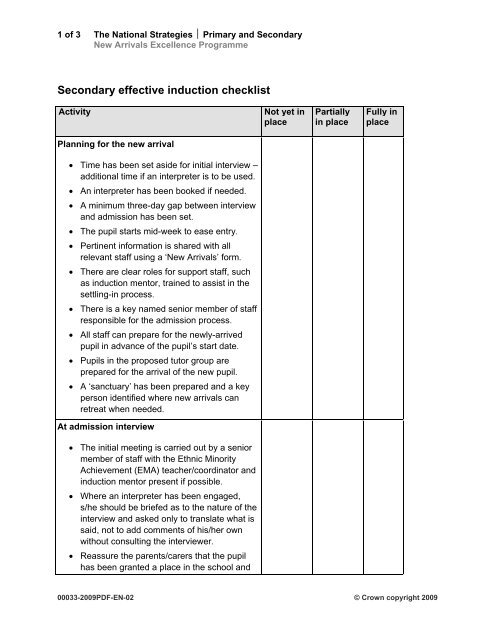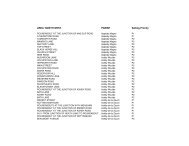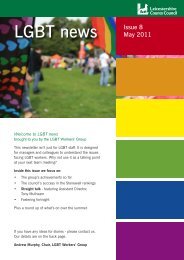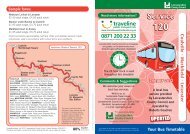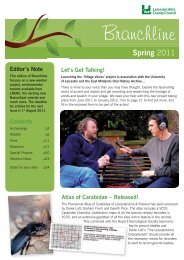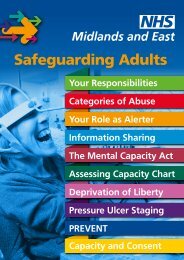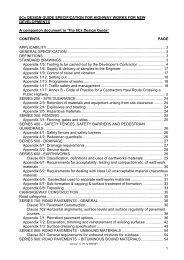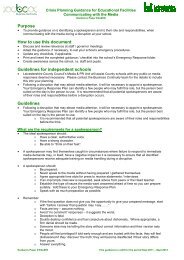Primary effective induction checklist
Primary effective induction checklist
Primary effective induction checklist
Create successful ePaper yourself
Turn your PDF publications into a flip-book with our unique Google optimized e-Paper software.
1 of 3 The National Strategies <strong>Primary</strong> and Secondary<br />
New Arrivals Excellence Programme<br />
Secondary <strong>effective</strong> <strong>induction</strong> <strong>checklist</strong><br />
Activity<br />
Not yet in<br />
place<br />
Partially<br />
in place<br />
Fully in<br />
place<br />
Planning for the new arrival<br />
Time has been set aside for initial interview –<br />
additional time if an interpreter is to be used.<br />
An interpreter has been booked if needed.<br />
A minimum three-day gap between interview<br />
and admission has been set.<br />
The pupil starts mid-week to ease entry.<br />
Pertinent information is shared with all<br />
relevant staff using a ‘New Arrivals’ form.<br />
There are clear roles for support staff, such<br />
as <strong>induction</strong> mentor, trained to assist in the<br />
settling-in process.<br />
There is a key named senior member of staff<br />
responsible for the admission process.<br />
All staff can prepare for the newly-arrived<br />
pupil in advance of the pupil’s start date.<br />
Pupils in the proposed tutor group are<br />
prepared for the arrival of the new pupil.<br />
A ‘sanctuary’ has been prepared and a key<br />
person identified where new arrivals can<br />
retreat when needed.<br />
At admission interview<br />
The initial meeting is carried out by a senior<br />
member of staff with the Ethnic Minority<br />
Achievement (EMA) teacher/coordinator and<br />
<strong>induction</strong> mentor present if possible.<br />
Where an interpreter has been engaged,<br />
s/he should be briefed as to the nature of the<br />
interview and asked only to translate what is<br />
said, not to add comments of his/her own<br />
without consulting the interviewer.<br />
Reassure the parents/carers that the pupil<br />
has been granted a place in the school and<br />
00033-2009PDF-EN-02 © Crown copyright 2009
2 of 3 The National Strategies <strong>Primary</strong> and Secondary<br />
New Arrivals Excellence Programme<br />
that the interview is only for information<br />
gathering purposes.<br />
Parents are offered all appropriate forms,<br />
such as free school meals (FSM)<br />
applications, uniform grant application, etc.<br />
Administrative staff are welcoming to parents<br />
and pupils and offer sensitive help with form<br />
filling if needed.<br />
Information about the school is made<br />
available in the home language.<br />
Parents are shown around the school.<br />
New arrivals can be given ‘starter packs’<br />
containing pen, pencil, bilingual dictionary (if<br />
appropriate) and homework booklet.<br />
New families can be given ‘welcome packs’<br />
containing a map of the local area, plan of<br />
the school, timetables, list of local community<br />
groups and so on in an accessible format.<br />
Once the new arrival has started<br />
Designate a senior member of staff as key<br />
contact. This might be the head of year, tutor,<br />
EMA coordinator or <strong>induction</strong> mentor.<br />
Allocate trained peer ‘buddies’ or mentors.<br />
Assess the pupil’s level of English,<br />
mathematics and science through<br />
information gained from a wide range of<br />
sources. (Written formal tests are unlikely to<br />
reflect accurately the potential of a pupil new<br />
to the English education system).<br />
Place pupils appropriately: placing pupils in<br />
lower groups or sets because of a perceived<br />
lack of English will not provide them with<br />
good models of English or behaviour or<br />
necessarily be appropriate for their ability in<br />
the subject.<br />
Consider class size and gender balance,<br />
whether there is a same-language speaker in<br />
the class, support during class periods,<br />
gender of teacher and supportive nature of<br />
the class when placing new pupil.<br />
00033-2009PDF-EN-02 © Crown copyright 2009
3 of 3 The National Strategies <strong>Primary</strong> and Secondary<br />
New Arrivals Excellence Programme<br />
Be flexible when timetabling initially as<br />
changes may be needed following further<br />
assessments.<br />
Ensure that tracking and monitoring<br />
systems are in place so that the progress of<br />
new arrivals is carefully followed.<br />
Set short-term social and academic<br />
targets to enable the school to monitor early<br />
progress and to alert staff to any potential<br />
difficulties.<br />
Plan a review meeting a few weeks after<br />
admission with parents, teachers and support<br />
staff to discuss progress and any other<br />
issues arising.<br />
Monitor and review pupils’ learning closely<br />
and frequently to alert staff to potential ability<br />
or difficulty.<br />
00033-2009PDF-EN-02 © Crown copyright 2009


